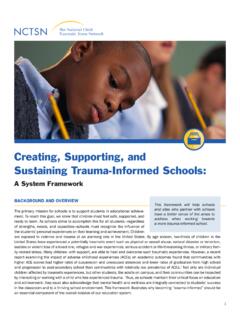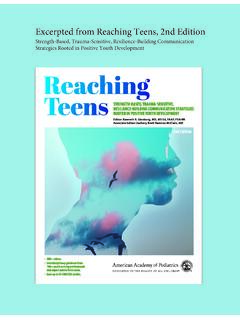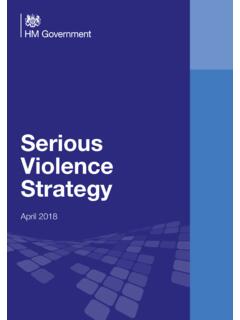Transcription of Multi-Agency Children Services Threshold Guidance ...
1 Sensitivity: NOT PROTECTIVELY MARKED. Multi-Agency Children Services Threshold Guidance : Continuum of Help & Support 2020. Wolverhampton Safeguarding Together Shared Guidance to help practitioners working with Children , young people, families and carers to identify needs early and assist in deciding how best to help and protect our Children . VERSION January 2021. Sensitivity: NOT PROTECTIVELY MARKED. Introduction The Children and Social Work Act 2017 sets out how agencies must work together by placing new duties on the Local Authority, police and clinical commissioning groups to work together and include other local partners to safeguard and promote the welfare of all Children in their area.
2 This Guidance is for everyone who works with Children , young people, their families and carers in Wolverhampton. It is about the way we all work together, share information and make sure that Children and families are always our main focus and concern when we are providing effective support to them. This advice is to help us to help families to become stronger and more resilient so that they can identify what is difficult and find solutions before their difficulties become complex that specialist statutory social work help is required. This document must be read alongside Safeguarding Wolverhampton Together procedures that reflect the legal framework underpinning work with Children to promote their welfare and prevent abuse.
3 These procedures are available at: These procedures are more detailed and provide practice Guidance about expectations for safeguarding practice across the West Midlands. This Guidance offers a framework for us to work together so that we use our resources more effectively and bring about positive and sustained changes for Children , young people, their families and carers. To do this we need to work collaboratively and honestly with the right Children and their families/carers to identify strengths and needs, to find practical and achievable solutions, and to provide the right amount of information, advice and support at the right time. Having the Right Conversations In Wolverhampton, all our Services are responsible for promoting conversations, which are essential to identifying and providing an appropriate response to concerns.
4 Having the right conversation with the family/child can help identify concerns and needs at an early stage and enable professionals and agencies to provide appropriate early support. At any time when a family is being offered support and help from any agency , it is important that practitioners feel they can ask for help and advice and draw on the expertise of others. All practitioners, Services , schools and other settings who work with families should feel able to consult with one another, within the remit of information sharing at any time before deciding on a course of action or way forward. Any professional and/or agency working with Children , young people and their families is responsible for starting conversations and taking appropriate action.
5 Agencies are encouraged to initiate the conversations with their own Designated Safeguarding Lead and in line with any internal agency safeguarding procedures as a first step. Communication with members of the family and other professionals and agencies, enables early identification and response to the needs of Children and young people and their family. Listening, thinking, challenging, connecting and discussing the resources and Services that can support a family will promote a shared responsibility and collaborative working. Some conversations may need to focus immediately upon what you are worried about, what's working well and what needs to change in order to build resilience or stabilise a situation.
6 At the initial stage, professionals and agencies are expected to carry out an assessment of the concern and where appropriate, create a plan to support the child/young person and their family. Conversations can be challenging and the complexity of the needs of each individual child and their family is unique. Clear communication methods are essential to identify needs and risks to ensure the health and wellbeing of the child, while proactively building relationships, capacity, and resilience within families. The principle here is that we want more conversations to help us to offer the right response at the right level at the right time. Sensitivity: NOT PROTECTIVELY MARKED.
7 All conversations should be accurately recorded to show that they took place, what actions were agreed and how it is progressed or tracked. If any professional or member of the public has concerns about a child and want an opportunity to talk these through with Children 's Services before deciding the best course of action, they must contact the multi agency Safeguarding Hub (MASH) on 01902 555392. All partners are encouraged to have a discussion with their own Designated Safeguarding Lead in the first instance. All professionals contacting the MASH must record the consultation within their agency records. If, following a discussion with the MASH, a professional wishes to make a formal referral, they should do this separately by completing the electronic Multi-Agency Referral Forum (eMARF).
8 Escalating Concerns Safeguarding is everyone's responsibility and effective, collaborative working is essential. Professionals need confidence in talking with each other about decisions that have been made, discussing concerns about those decisions and, when there isn't agreement, escalating those concerns if appropriate. The need for staff to feel confident in their understanding of when and how to raise effective challenges about practice is essential in achieving the best outcomes for Children . Equally important is the culture of how we work, and it is vital professionals are encouraged to be professionally curious and raise issues when they feel their concerns for Children and young people are not being effectively addressed.
9 If you do not agree with any decision regarding the welfare of a child at any point, you must challenge it with clear rationale and reference to the thresholds by contacting the relevant practitioner. To ensure that Children are not left at risk, escalations will need to be undertaken as soon as the concern is identified. If there is still disagreement you must escalate the case to your manager within your agency and, if necessary, the Safeguarding Lead within your agency . Please refer to your own agency 's safeguarding policy for further details. We encourage that all escalations are recorded as they are often key decision points in the life of a child/young person and their family.
10 For more information on escalation and how to resolve professional differences, refer to the Wolverhampton Safeguarding Together Escalation Policy. thresholds thresholds describe entry points across the range and scale of Children 's need. This will lead to a response or intervention that will meet that need, appropriate to the level within this Guidance document. The purpose of thresholds is not to label' a child, young person or family but to identify the right Services to wrap around the child and family to improve the situation. It is essential that during delivery of Services to Children , young people and their families, any additional needs are identified as early as possible and intervention is put in place with a focus on providing early help and preventing the need for specialist Services .






